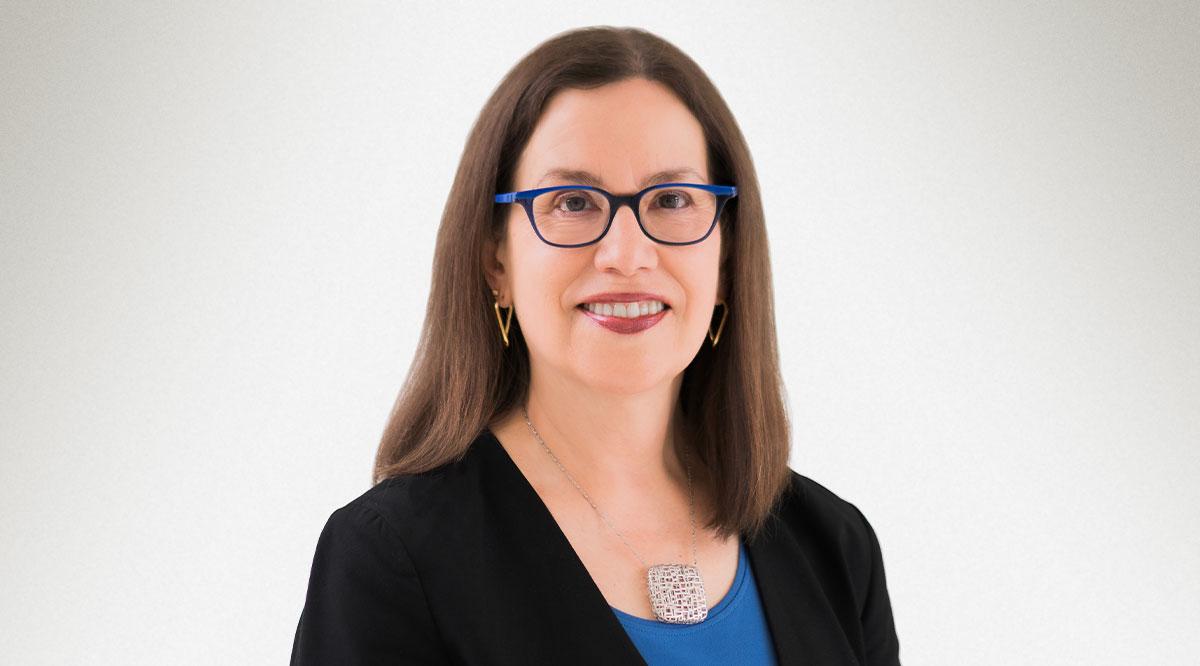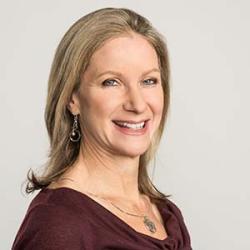As a physician and scientist, Elena Fuentes-Afflick, MD, MPH, has long combined her research and clinical interests to improve the lives of her patients and their families. On July 16 she joins the AAMC as chief scientific officer, a role in which she will lead the association’s research and science policy efforts, as well as oversee direction of the Center for Health Justice, which develops and promotes health equity research and policy.
A pediatrician by training, Fuentes-Afflick comes to the AAMC from the University of California, San Francisco (UCSF), where she was a professor of pediatrics and vice dean for the UCSF School of Medicine at Zuckerberg San Francisco General Hospital. She has held national leadership roles as a council member and president for both the American Pediatric Society and the Society for Pediatric Research. Fuentes-Afflick is an elected member of the American Academy of Arts and Sciences and the National Academy of Medicine (NAM). Currently, she serves as NAM Home Secretary. Her scholarly work has focused primarily on issues of equity, including Latino health, immigrant health, health disparities, and diversity in academic medicine.
“I am energized to apply my lifelong passion for — and commitment to — academic medicine to the AAMC, and to lead efforts to educate the nation about the value of science and research,” she says.
Fuentes-Afflick recently spoke with AAMCNews about the challenges facing scientists in a post-pandemic world, and about the opportunities for researchers and physicians in academic medicine.
This interview has been edited for brevity and clarity.
You are a pediatrician by training. What made you choose that specialty?
I’m a very happy pediatrician. I considered a number of other specialties, but I’m very glad that I chose pediatrics. I believe that children represent our future, and it’s a privilege to contribute to growing and facilitating the development of children, adolescents, and young adults. I think we have the opportunity to make a really important societal contribution through our work.
Pediatrics is not for everyone, clearly. A lot of people will say, “But you can’t talk to your patients,” or “It’s hard to see sick children or to see children die,” and that is all true, but most children are healthy, and most of them grow up and have an opportunity to be the next generation of our society.
Much of your research focus has been on issues of equity, in patient populations but also in the health care workforce. Why is equity in the health professions so important?
What we all understand at a very clear level is that we live in a society and work in professions that have a long history of inequity. And as our societies become more diverse, as our workforce is slowly becoming more diverse, issues of equity and opportunity have emerged as very compelling topics that challenge us, at all points in the profession, to understand and address them. My priority is to be sure that, as health professionals, we offer opportunities to everyone who is interested in working in our profession. At a personal, departmental, institutional level, we must ensure that equity is central in our values as well as in our operations. We have to talk the talk. We also have to walk the walk. And by that, I mean that we want individuals to thrive and make their own unique contributions, and therefore a focus on equity is required overall and at the highest levels of leadership.
You’ve been studying health equity for most of your career. What has been the biggest change that you’ve noticed?
I’ve always been interested in issues that we would now call health equity, mostly because of my personal experience as well as my clinical experiences working at public hospitals in San Francisco, where issues of diversity are central to what we do. During the early days at UCSF, we were a loosely formed group of investigators from different departments, but we all had a commitment to what we originally called minority health. So we came together as a group under the leadership of Dr. Gene Washington and Dr. Eliseo Pérez-Stable, who both have had remarkable careers advancing health equity for the nation. And we created a structure, an institutional structure, for the university that we called the Medical Effectiveness Research Center for Diverse Populations [now called the Multiethnic Health Equity Research Center]. It gave us an organizational home and helped us form our research agenda and research community focusing on various topics, depending on our specialty or our discipline. And over time, our community grew, the national community grew, and now we find we’re at a point where health disparities, when we use that term, we understand what it means. We have a common understanding of why it’s important, and we understand it’s important for clinical care, for education, for research, for policy. So in 30 years, it’s been really remarkable to see how much more sophisticated we are now and how it seems to be a shared priority.
During the COVID-19 pandemic, we learned just how important funding basic science is — when research on mRNA vaccines over the past 20 years helped produce a vaccine in record time. And yet we also know that there are disparities in what and who gets funded. What are your thoughts on improving equity in NIH funding?
As you know, there is a perception among the research community, supported by a growing body of literature, that there are disparities in the topics addressed or the topics that are funded and the people who are funded. So because the National Institutes of Health is a major supporter of research in our country and in academic medicine, I think what NIH does sets a model for others. I believe it’s really important in this role for me to work with NIH to support their efforts to ensure equity in the granting of funds, to the extent that they can modify their existing structures or review their processes and identify areas to improve. Almost all of the major health issues in our country have a disparities element in terms of who is affected or who dies, etc. And so the disparities lens applies to nearly every topic, and I hope to work in partnership with NIH to address these issues.
The COVID-19 pandemic ushered in a great deal of mistrust in science and the scientific community. What do you think can be done to improve how science and scientists are perceived in the public eye?
I’m very concerned and sometimes discouraged about this shift in the perception of the value of science and research, as well as the perception of the people who do the science and the research, because we have compelling issues that need to be addressed, and they can be addressed by our community.
As we recover from the pandemic, it is discouraging that people question the value of vaccines, the approach that we took to COVID, the intersection between medicine and public health, and the impact of climate change on health. We need to bring good science to these important questions. But then, how do we ensure that we’re communicating the message in a way that is both understandable and believable? We’ve always focused on the understanding piece, thinking that we don’t want to use too much jargon, we don’t want to speak at the wrong level. But we’ve had an implicit assumption that we were believable, that we were trusted advisors, and now that we understand that that is not necessarily a shared assumption, we have to rethink how we approach these issues and really approach it, I believe, from a perspective of how do we build trust? What is trust? How do we convey it? How do we address mistrust? I look forward to working with other members of the AAMC community who also have expertise in this area, because we have great science, and we have the promise of more good work, but that final piece of conveying it to the public and conveying it to funders and really having them embrace the value of what we are sharing, that’s a piece that requires urgent action.
I’m sure you’re following the emergence of avian flu in dairy cattle and a few farmworkers. How concerned are you about the potential for this to turn into the next pandemic?
I am concerned about the avian flu. What we have learned so far already demonstrates the fact that information changes almost by the day, so what you knew yesterday may not be accurate today, and that demonstrates the challenge of keeping up-to-date on research and science. It requires active investment in knowledge and acquiring knowledge and synthesizing knowledge. So this is a very quickly evolving topic. I believe it’s important for the research and science communities to be in close communication, so that key leaders as well as everyday researchers and scientists, and health care providers, can have accurate, up-to-date information. But building on what we just learned from the COVID-19 pandemic, we have to be integrating public health approaches with medicine, research, and science, and that requires, obviously, relationships and organizational collaboration. And I think we have some work to do to ensure that those kinds of relationships and communications are strong enough to be accurate and informative to our community, because none of us wants to relearn the lessons of the COVID-19 pandemic, especially while it’s still not really over.
We’ve talked about some of the biggest challenges facing science and scientists. Are there others?
There are definitely challenges that medical researchers face today. There are also many, many exciting opportunities. Sometimes I think we focus a little too much on challenges and overlook the opportunities that we have, but I think that they are both exciting, because right now, we know that it takes a lot to prepare for and sustain a successful career in biomedical research. The possibilities are many. The spectrum of research is so broad, and the problems are so compelling, but we know that we ask a lot of people when they are training and when they are ready to embark on their own career.
We also know that the people who are training for these careers have opportunities that were not very common 10 or 20 years ago. I’m thinking particularly about industry and biotech. There are many new career opportunities, but they each require a slightly different skill set, so we have to make sure we are preparing people for the careers that they will choose.
You’ve been in academic medicine for many years. Is academic medicine a compelling career choice for physician researchers today?
What I love about academic medicine is the variety. Every day is different. Sometimes you get surprised by what you do in a given day. It doesn’t always match your expectations. But every day you have the opportunity to do something important and impactful. And what I love about medicine as a profession is that if you’re passionate about academic medicine, that can be your path. If you’re passionate about clinical care, there are many opportunities. If you’re passionate about medical education, we now understand that as a legitimate career path for a physician, including physician researchers. So there are so many opportunities in academic medicine that I find it not only great for me but, I hope, welcoming and compelling for future generations.

